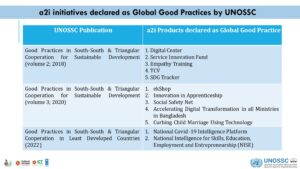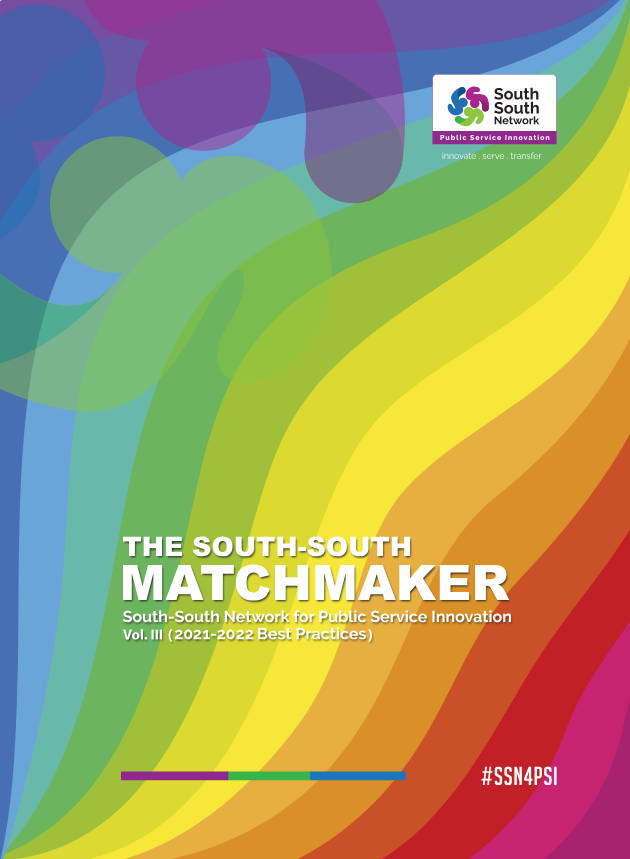Our Initiatives
The South-South Network for Public Service Innovation (SSN4PSI) is a global collaborative platform where governments, private sector organizations, civil society organizations, and academics exchange knowledge, experiences, and expertise on public service innovation.
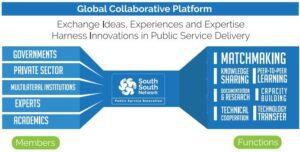
Its establishment was proposed by the Honourable Prime Minister of Bangladesh, Sheikh Hasina, and the UNDP Administrator, on the sidelines of the 71st session of the United Nations General Assembly in September 2016.
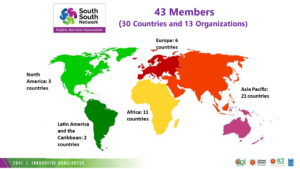
In November 2017, SSN4PSI was formally launched at Global South-South Development Expo in Antalya, Turkey jointly by United Nations Office for South-South Cooperation (UNOSSC) and the Government of Bangladesh.
THE SECRETARIAT
UNOSSC and a2i have been providing secretarial support to SSN4PSI from the outset. Since 2017, a2i has been successfully functioning as the Secretariat for SS4NPSI growing the network’s membership to over 44 countries, bilateral and multilateral agencies and development organizations creating hundreds of matchmaking opportunities that facilitate the transfer of technologies across nations.
FOCUS AREAS
- Future of Public Service
- Future of Civil Service
- Future of Work
- Future of Digital Financial Services
- Future of Digital Economy
- Future of Data Innovations
“We at the UNOSSC, are supporting the ideas of SSN4PSI to harness innovations in the area of public service delivery and to help countries in the Global South achieve the Sustainable Development Goals.” Mr. Adel Abdellatif
Director (a.i), United Nations Office for South-South Cooperation (UNOSSC)

- United Nations General Assembly 2016 Side-Event: South-South and Triangular Cooperation on Scaling Up Innovations in Public Service Delivery
Description: A key outcome of the meeting will be the establishment of a South-South Network of public organizations that are actively incorporating procedural and technological innovations in the developing countries to establish a culture of citizen-centric innovation within the respective governments. The network would undertake the identification of good practices in public service delivery innovations and facilitate sharing of such knowledge with a view to scaling up these innovations in the South. The countries in the North may bring in the wealth of their experiences for knowledge sharing, and may provide support to the network. However, the success of such a network will depend on how quickly and appropriately a government of a developing country is able to internalize the knowledge of a successful scaled-up innovation and adapt it to its context.
- Innovations in Service Delivery: The Scope for South-South and Triangular Cooperation, Dhaka, Bnagladesh, 2017
Description: The proposed workshop in Dhaka, Bangladesh, seeks to provide a timely platform to facilitate the exchange of knowledge, experiences and expertise to assist a more comprehensive understanding of citizen-centric service delivery and identify potential for its application whereby countries and partners can benefit from a South-South approach. More concretely, it seeks to explore the role that innovation in service delivery can play in the realization of the Sustainable Development Goals (SDGs). This event aims to bring together relevant stakeholders, including public, private sectors and civil society organizations from across the academic, technical and international development communities to discuss ways of harnessing innovations in public service delivery for socioeconomic development.
- United Nations General Assembly 2017 Side-Event: SDG Implementation Financing and Monitoring, Sharing Innovations through South-South and Triangular Cooperation
Description: The side-event is designed to make progress towards actualizing the proposed South-South Network for Public Service Innovations. Additionally, it seeks to provide an opportunity for Heads of State and Government, policymakers and development practitioners to share knowledge and experience on the following:
- Good practices in advancing South-South Cooperation Framework;
- Effective South-South Cooperation framework that helps answer questions on critical issues such as innovations in public service delivery and up-scaling and adaptation of such innovations;
- Effective and practical ways of measuring progress against preset targets of achieving SDGs; correlating among inter-related SDG targets; and
- The kinds of traditional and modern data collection mechanism/strategies that government and non-government entities can use to effectively track SDG progress.
- BAPA 40+ Side Event: A Glimpse of the Future South-South and Triangular Cooperation – Asia-Pacific’s Contribution in Science, Technology and Innovation,
Description: Against that backdrop, “A Glimpse of the Future South-South and Triangular Cooperation – Asia-Pacific’s Contribution in Science, Technology and Innovation” will provide a timely opportunity for high-level participants from government and other key policymakers to share knowledge and experience on Science, Technology, and Innovation. Furthermore, in a related event, a Matchmaking Workshop for relevant stakeholders had convened.
- HLPF Side Event on “Strengthening Government Data4Recovery Capacity with a Focus on Public Health” 2021
Description: The primary objective of this side event is to bring governments, development partners, UN entities, the private sector, and academia together to share best practices and exchange views on how to acquire the knowledge and tools they need to develop collective data intelligence systems that harness data and technology customized and utilized on a national scale to provide evidence for decision making, strategizing and ultimately, accelerating COVID-19 recovery. The Side Event will focus on data that informs the process of strengthening and rethinking public health policy in the new normal and feature presentations on working models being used by partners.
- World Data Forum Side Event, Decision Making for COVID-19 Response Using Data Intelligence System, 2021
Description: The mini-session brought governments, Development Partners (DP)s, UN entities, the private sector, and academia together to share best practices and exchange views on how to respond to COVID using a collective, resilient and agile data platform and create scope for collaboration within/among nations as well as to boost the taking of timely actions through a “data revolution” to ensure equal access to health services. It provided a platform to explore innovative ways together to apply health sector data insights for
tracking progress and making evidenced-based decisions for strengthening LNOB. Emphasis had given to explore strategies to enhance the accessibility of diversified groups to open data analyze.
- ACSH Annual Conference 2021, side matchmaking workshop on Public Service Delivery in the Era of SDGs
Description: The main objective of the event is to develop a deeper understanding and broader exchange in the Global South by identifying vital and novel innovations for scaling-up public service innovation, more specifically;
- Facilitate match-making among participating countries and other relevant stakeholders;
- Facilitate an inclusive understanding of the kind of service delivery innovations that create sustainable impact and process of creating that impact in Global South
- Facilitate the inclusive understanding of the good practices identified to address the COVID-19 pandemic in Global South
- Exhibit proven pathways from innovation prototyping to up-scaling
- Explore more broadly the role of public service innovations in the realization of the Sustainable Development Goals.
- Ministerial Event, 2022 under the WCIT conference 2022
Description: The WCIT is a signature event of the World Information Technology & Services Alliances (WITSA). The 25th WCIT 2021 was hosted in Bangladesh with the theme “ICT – The Great Equalizer”. In WCIT 2021, leaders from the Government and IT industry, ICT Ministers of different countries, entrepreneurs, CEO’s and renowned speakers from home and abroad participated. The Ministerial Conference was held on November 11, 2021, on the topic “Ensuring an Inclusive, Trusted and Sustainable Digital Society”.
Apart from these, we have a number of events which we organized at different levels over the past few years. If required, we can provide those as well.
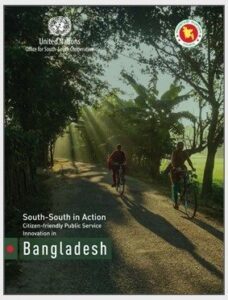
https://unsouthsouth.org/2017/09/20/citizen-friendly-public-service-innovation-in-bangladesh-2017/
The United Nations Office for South-South Cooperation presents the South-South in Action series with the Government of the People’s Republic of Bangladesh. This publication on Bangladesh’s experiences in development is special in the context of South-South cooperation.
Bangladesh is generally considered one of the smaller countries in South Asia. However, this publication captures the massive gains made by the country despite challenges ranging from pre-independence war, the world’s densest population and frequent natural disasters. Bangladesh met most of the Millennium Development Goal targets well ahead of schedule and its economy has grown at an average rate of 6 per cent per annum. Through experimentation and innovation in the areas of poverty reduction, disaster mitigation and economic management, Bangladesh’s role in innovation gained momentum and respect from development partners over the years.
In the last decade, Bangladesh borrowed ideas from other countries, adapted them and scaled up implementation to benefit millions of its 161 million citizens in the area of public service innovations. The gains from these innovations are quantifiable in terms of time and resources. The innovations described in this publication show the potency of digitized public service reforms in meeting the Sustainable Development Goals, especially Goals 16 and 17.
This publication illustrates the central tenet of South-South cooperation, which to some is only a politically correct statement, that all countries have something to offer. Bangladesh has plenty to offer and more.
The case studies included will enable the reader to easily adapt what was done and to seek technical assistance from the people best qualified to provide it in Bangladesh. Furthermore, the publication shows that sharing knowledge with Bangladesh is a worthwhile investment. In the case of public service reforms, the country borrowed pieces of innovation from many partners to develop a wholesome programme that many developing countries are now adapting.
In the publication, Bangladesh also presents a model or South-South cycle from adaptation to diffusion of experiences akin to the project cycle.
